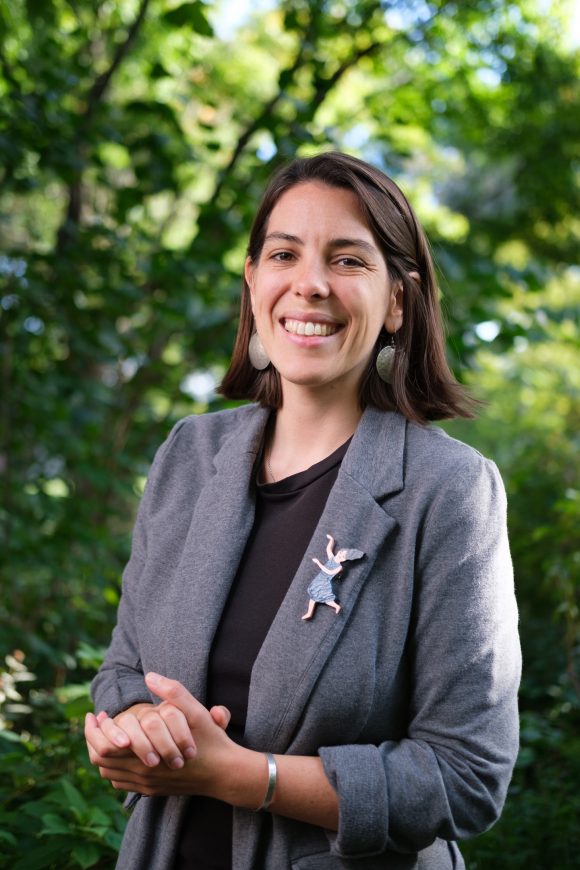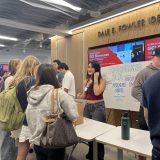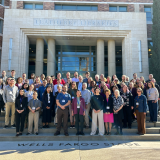Welcome New Schmid Faculty — Christine O’Connell
Announced on September 8, 2024
 Please join us in welcoming Christine O’Connell to Schmid College of Science and Technology. O’Connell will serve as an Assistant Professor of Biological Sciences.
Please join us in welcoming Christine O’Connell to Schmid College of Science and Technology. O’Connell will serve as an Assistant Professor of Biological Sciences.
O’Connell is an ecosystem ecologist and global change scientist whose research focuses on how climate change and global change disturbances are altering terrestrial biogeochemical processes and patterns, particularly in soils. Her current projects include work in tropical forests in Puerto Rico and Costa Rica and, now, work studying the Eaton Fire in Altadena, California. O’Connell holds a Ph.D. in Ecology, Evolution and Behavior from the University of Minnesota and a B.S. in Earth Systems (Biology Concentration) from Stanford University. She completed postdoctoral research at the University of California, Berkeley. Prior to joining Chapman, O’Connell was an Assistant Professor of Environmental Studies at Macalester College.
Q&A with Christine O’Connell, Assistant Professor of Biological Sciences
Q: What role were you in before this one?
A: I was previously an Assistant Professor of Environmental Studies at Macalester College. During my time at Macalester I loved the blend of teaching, research, and student mentoring that I am lucky enough to be able to do as a professor at an undergraduate-focused school. I am really excited to be able to do the same kind work here at Chapman and in Schmid.
Q: What is your current area of research — and why are you passionate about it?
A: I love being an ecologist! I use ecosystem ecology to explore the environmental impacts of global change, most often in tropical forests. Students in my lab ask questions about how climate change and land use change are altering the carbon, nitrogen, and phosphorus cycles in terrestrial ecosystems, and what this means for the future of climate.
Right now, we are primarily focusing on the impact of drought, hurricane disturbance, warming and elevated atmospheric CO2 on tropical forest ecosystems. We do much of our work in Puerto Rico, and students conduct ecological field work in a protected tropical forest in Puerto Rico (and potentially other places) and work as environmental data scientists.
My past undergraduates have done things like: Spent the summer in Puerto Rico measuring how hurricanes might impact tree species and carbon cycling dynamics; used big data to advocate for replacing lawn parcels with native plant garden beds on a college campus; tracked how climate warming is shifting greenhouse gas emissions from soils in Puerto Rico; designed and conducted an experiment looking at how drought and warming alters fungal communities and litter decomposition.
I also have a new set of projects related to how the Eaton Fire has impacted soils in Altadena, Pasadena and Los Angeles, California. It’s been incredibly rewarding to work on research that is directly impacting our local communities. My family lives in Pasadena, so it’s meant a lot to be able to engage with my own neighborhood as a scientist as well as a person.
Finally, environmental and social justice are woven into my lab group and I stand against racism and inequality. I recognize the importance of, and am committed to, cultivating a culture of diversity, equity, and inclusion. Science is for everyone!
Q: What would you be doing if you weren’t a scientist?
A: Perhaps an environmental lawyer? I’ve always been very interested in the environment, conservation and sustainability.
Q: Got any fun facts to share?
A: Before getting my Ph.D., I was a high school biology teacher in Brooklyn, NY. In my outside-of-work life, I have a very beloved dog, Luke, who is named after my field site in Puerto Rico and who loves hiking and going to the dog beach. I also have a two-year-old daughter and a spouse, both of whom also adore Luke and enjoy bringing him to the beach and on hikes!
Q: What are you looking forward to most this semester?
A: Getting to know Chapman students!

